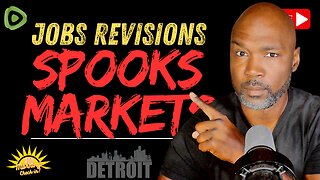Premium Only Content

Racism Amongst NFL Owners: An Unspoken Barrier to Diversity and Inclusion
Racism Amongst NFL Owners: An Unspoken Barrier to Diversity and Inclusion
Introduction
Racism and exclusion have long been significant issues in the National Football League (NFL), a professional sports organization that is not immune to the societal problems that plague America. These issues, surprisingly, are not confined to the playing field; instead, they extend to the boardrooms or the owners' suites, where decisions are made that shape the league's policies, practices, and culture. This essay will explore the history and implications of racism amongst NFL owners and the steps the NFL has taken to address these issues and promote diversity.
The Historical Perspective
The NFL, founded in 1920, initially had no Black players. It wasn't until 1946 that Kenny Washington broke the color barrier, years before Jackie Robinson did the same in Major League Baseball. However, ownership has remained a largely white domain for much of the NFL's history. As of my knowledge cutoff in 2021, just two of the 32 NFL teams have non-white majority owners: Shahid Khan, a Pakistani-American who owns the Jacksonville Jaguars, and Kim Pegula, a Korean-American who co-owns the Buffalo Bills.
A significant part of the problem lies in the exclusivity of NFL team ownership. Acquiring an NFL team requires substantial financial resources, often in the billions of dollars. This economic barrier effectively excludes most people, particularly people of color, due to the racial wealth gap in America. This wealth disparity is rooted in centuries of racial discrimination, including slavery, segregation, redlining, and discriminatory hiring practices, which have disproportionately affected Black and other minority communities.
The Rooney Rule
In 2003, the NFL implemented the Rooney Rule, which requires teams to interview at least one minority candidate for head coaching and general management positions. The rule was a response to the glaring lack of minority representation in the NFL's leadership. Despite being named after Dan Rooney, the former Pittsburgh Steelers owner and chairman of the league's diversity committee, the rule does not extend to team ownership.
While the Rooney Rule has led to a modest increase in minority hiring at the coaching level, it's been criticized for its limitations. Teams have been accused of conducting "token" interviews to fulfill the rule's requirements without seriously considering the minority candidates. Moreover, the rule does not address the fundamental issue of racism and exclusion at the ownership level.
Unconscious Bias and Prejudiced Behavior
Unconscious bias factor significantly in the NFL ownership culture. Many owners may not actively discriminate, but their actions and attitudes are informed by subconscious prejudices. This can manifest in various ways, such as favoring candidates who look like them or share similar backgrounds, thereby perpetuating a cycle of exclusion.
There have also been instances of overt racism. Notably, in 2014, then-Los Angeles Clippers owner Donald Sterling was banned from the NBA for life for making racist comments. While this occurred in a different sport, it underscores the potential for racism among sports team owners.
The Path Forward
Addressing racism among NFL owners requires a multifaceted approach. First, the NFL must acknowledge and address the issue. This includes implementing policies that promote diversity and inclusion at all levels, including ownership. The league could expand upon the principles of the Rooney Rule to include ownership opportunities.
Second, it's crucial to promote economic policies that address the racial wealth gap, both within the NFL and society at large. This could involve initiatives to support minority-owned businesses, for instance, or efforts to make the NFL more accessible to minority investors.
Lastly, education is key. Owners, like all individuals, must be willing to confront their biases and prejudices. This involves not only formal diversity training but also the promotion of a culture that values and respects all individuals, regardless of race.
Conclusion
Racism amongst NFL owners is a complex issue that reflects broader societal problems. However, by acknowledging these issues and taking concrete steps to address them, the NFL has the opportunity to lead by example and promote a more inclusive and equitable sports culture. The path to overcoming racism is not easy, but it is a journey that the NFL, like all institutions, must undertake to create a more equitable and inclusive society.
#NFLDiversity #EndRacism #SportsEquality
#InclusiveNFL #RooneyRule #ChangeInSports
#DiversityInSports #StopRacismNFL #NFLInclusion
#BreakTheBarrier
-
 5:22
5:22
Michael Heaver
12 hours agoBritain's Enraged Voters Reject EXTREME Agenda
1.37K -
 LIVE
LIVE
Rebel News
1 hour agoNo trade deal for Carney, Christian cancelled in BC Bible Belt, Liberal bail reform | Rebel Roundup
349 watching -
 LIVE
LIVE
The Drew Allen Show on DailyClout
1 hour ago"Russiagate Is ‘Crime of the Century’"
91 watching -
 1:20:41
1:20:41
Steven Crowder
4 hours agoBill Burr Flames Out on Conservatives, Whites, and... Ben Shapiro
191K106 -
 56:58
56:58
The Rubin Report
3 hours agoHow to Protect Yourself from Toxic Beliefs | Eckhart Tolle
41.3K24 -

The Mel K Show
2 hours agoMORNINGS WITH MEL K -Collateral Consequences of The Russia Hoax Must Be Addressed! 8-1-25
20.4K8 -
 LIVE
LIVE
Film Threat
17 hours agoTHE NAKED GUN BLOWS COMEDY | Film Threat Livecast
143 watching -
 DVR
DVR
Flyover Conservatives
12 hours agoAVOID BURNOUT: Why You Must View Your Work As Worship - Clay Clark | FOC Show
16.2K1 -
 36:09
36:09
Rethinking the Dollar
2 hours agoU.S. Job Market Fails—Real Talk on Gold, Ray Dalio & World ID | Morning Check-In
7.81K5 -
 LIVE
LIVE
JuicyJohns
5 hours ago $2.40 earned🟢#1 REBIRTH PLAYER 10.2+ KD🟢$500 GIVEAWAY SATURDAY!
128 watching